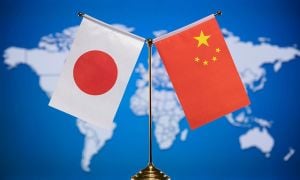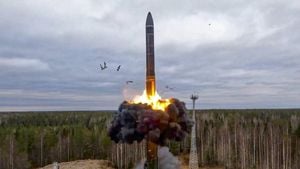Vladimir Putin has once again stirred the pot on the international stage with recent missile strikes on Ukraine, igniting fresh fears of escalation and nuclear threats. The Russian president announced the use of what he referred to as the Oreshnik missile on the city of Dnipro, marking the introduction of new weaponry symbolizing the Kremlin's uncompromising stance throughout this protracted conflict.
These missile attacks, described by Putin as conventional yet advanced, come amid heightened tensions following Ukraine's adoption of US and UK long-range weapon systems. The US Army Tactical Missile System (ATACMS) and UK-supplied Storm Shadow missiles have made their presence felt, with Ukraine reportedly leaning on these resources to hit targets deep within Russian territory.
Following the missile launch, Putin warned the US and UK not to underestimate Russia's military capabilities. He stated, "If anyone still doubts this, they shouldn’t. There will always be a response,” hinting at the possibility of nuclear escalation should Western nations continue to supply advanced munitions to Ukraine.
Ukrainian President Volodymyr Zelensky reacted strongly to Putin’s declaration, emphasizing the escalation this would mean for the war’s brutality. He argued, “This is yet more proof Russia has no interest in peace.” Zelensky's comments underline NATO's commitment to continue supplying Ukraine, as Western leaders collectively reject the idea of being intimidated by Russian threats.
Reports indicate significant doubts surrounding the nature of the Oreshnik missile. While Ukraine suggested it bore characteristics of intercontinental ballistic missiles (ICBMs), US National Security Council officials clarified it is likely only experimental. They believe Russia has limited quantities, so the threat it poses might not fundamentally change the dynamics of the conflict.
Putin informed the public about the successful test of the Oreshnik missile, which he claims hits targets at speeds of approximately 10 Mach, or over 7,600 miles per hour. This speed complicates any potential defense against such strikes. Analysts have commented on the broader military significance of this launch, making it clear its symbolism might outweigh actual tactical advantages.
The missile strike and ensuing rhetoric follow Ukraine's use of long-range missiles, highlighting the increasing military support from Western countries. The Pentagon acknowledged prior notification to the US via Nuclear Risk Reduction channels established for missile launch alerts, showcasing the delicate balance of communications between these powers amid growing tensions.
Putin’s declarations, alongside the grounding of North Korean military personnel in Russia, reflect not only the Kremlin's defensive strategy but also its willingness to invest militarily. With the US government endorsing Ukraine’s military capabilities with contingency plans, the specter of nuclear escalation hangs palpably above negotiations.
Military experts indicate the potential of intermediate-range ballistic missiles (IRBMs) like the Oreshnik to deliver precise strikes over vast distances, unlike the cruise missiles previously employed. Analysts have emphasized the importance of this shift from conventional munitions to advanced missile technology, signifying Russia's aggressive posture and broader military ambitions.
The unrest sparked by this latest development also intersects with geopolitical uncertainties surrounding the impending return of former US President Donald Trump. Trump has promised to withdraw American involvement from overseas wars, raising eyebrows among international observers who speculate how this could affect US-Russia relations should he reclaim office.
On the ground, Russian forces have escalated their air strikes against Ukrainian infrastructure as well, following the missile launch. This attack marks the 1,000th day since Russia invaded Ukraine, and the stakes seem higher than ever as both sides engage fiercely for territorial gains. Reports suggest Moscow is trying to leverage this situation to initiate another offensive aimed at reclaiming areas lost to Ukrainian troops.
The increasing aggressiveness of the Kremlin and the rhetoric surrounding nuclear capabilities mean the conflict could quickly spiral out of control, drawing in global powers on both sides as the world watches cautiously. Amid these tensions, several analysts punctuate the need for diplomacy to prevent miscalculations or misunderstandings, fearing the consequences if these aggressive postures lead to open conflict.
This dangerous escalation not only impacts the immediate region but resonates globally, as countries navigate their positions concerning military support to Ukraine and the responses from Russia. The interplay of fear, strategy, and international relations plays out on the global stage, with citizens on all sides left to wonder where this latest phase of the war may lead.



